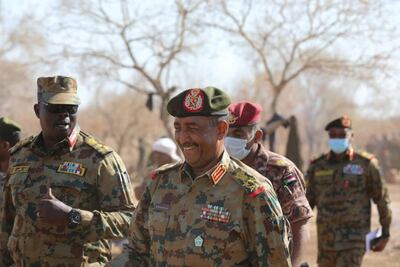Sudan’s head of state and top general vowed to defend to the last man a border strip his forces recently wrested from Ethiopian control after decades of occupation.
“It was never expected that it will come to that between us and our Ethiopian neighbours, but the party that started it must suffer the consequences,” Gen Abdel Fattah Al Burhan said.
Gen Al Burhan gave several addresses on Wednesday during a lightning visit to eastern Sudan’s border region.
His comments were released by the Sudanese military hours after his return to Khartoum that evening.
Gen Al Burhan’s visit to Al Fashqa fuelled tension between the two neighbours, pushing them closer to the prospect of an all-out war.

“We have been patient for too long and we have been suffering in silence, but everything has its limits," he said.
"This is our right and our land and we will all die defending it. Be entirely certain that we will never budge and we will never surrender our land ever again.”
The border crisis is also likely to compound the deadlock plaguing negotiations between the two countries and Egypt over a Nile dam being built by Ethiopia, which Sudan regards as a threat to its security.
Al Fashqa is within Sudan's international boundaries but had long been settled by Ethiopian farmers from the country’s powerful Amhara group
There were weeks of clashes between forces from both sides in the area late last year.
But the latest flare-up was sparked by the killing on Monday of five Sudanese women and a child, which Sudan blamed on a government-backed militia from Ethiopia.
Two Sudanese women are still missing after the raid.
Gen Al Burhan's comments were met with cheers by watching soldiers and residents.
Images released by the military showed him touring the region while standing on the back of an all-terrain pickup truck.
Hours earlier, Sudan’s Foreign Ministry warned of “dangerous consequences” after an Ethiopian warplane breached Sudanese airspace over the border region.
Also on Thursday, a high-level Sudanese military delegation flew to neighbouring Egypt.
There it briefed President Abdel Fattah El Sisi on the “latest on the current tension along the Sudanese-Ethiopian border", the Egyptian presidency said.
Egypt, Sudan’s long-time on-and-off ally, has been forging close ties with the Sudanese military in recent months.
The two recently held joint war games and exchanged high-level visits, and Cairo has repeatedly pledged to support Sudan's military and economy.
Ethiopia delivered its own set of stern warnings for Sudan this week.
On Tuesday, it told Khartoum that it was running out of patience with its continued military build-up in the border region.
"The Sudanese side seems to be pushing in so as to inflame the situation on the ground," Ethiopian Foreign Ministry spokesman Dina Mufti said.
"Is Ethiopia going to start a war? Well, we are saying, 'Let's work on diplomacy'."
Ethiopia also accuses the Sudanese military of infiltrating its territory, trying to take advantage of its continuing fight against separatist rebels in the northern region of Tigray.
The fighting there has forced at least 60,000 people to flee their homes and seek refuge in Sudan.
Sudan denied the claims.
“The land is Sudanese no matter what anyone says,” Gen Al Burhan said on Wednesday, promising civilians living in the border area that his troops would protect them.
“You will stay here and you will live in security."
Sudan and Ethiopia have long had problems along their border, the demarcation of which was determined in agreements reached in 1902 and reaffirmed in 1972.
A joint committee set up last month to resolve the border dispute failed to make any progress, the Sudanese government said.
The two countries are bound by close cultural ties but, in various conflicts since the 1950s, each side has supported rebel groups fighting the other's government.


